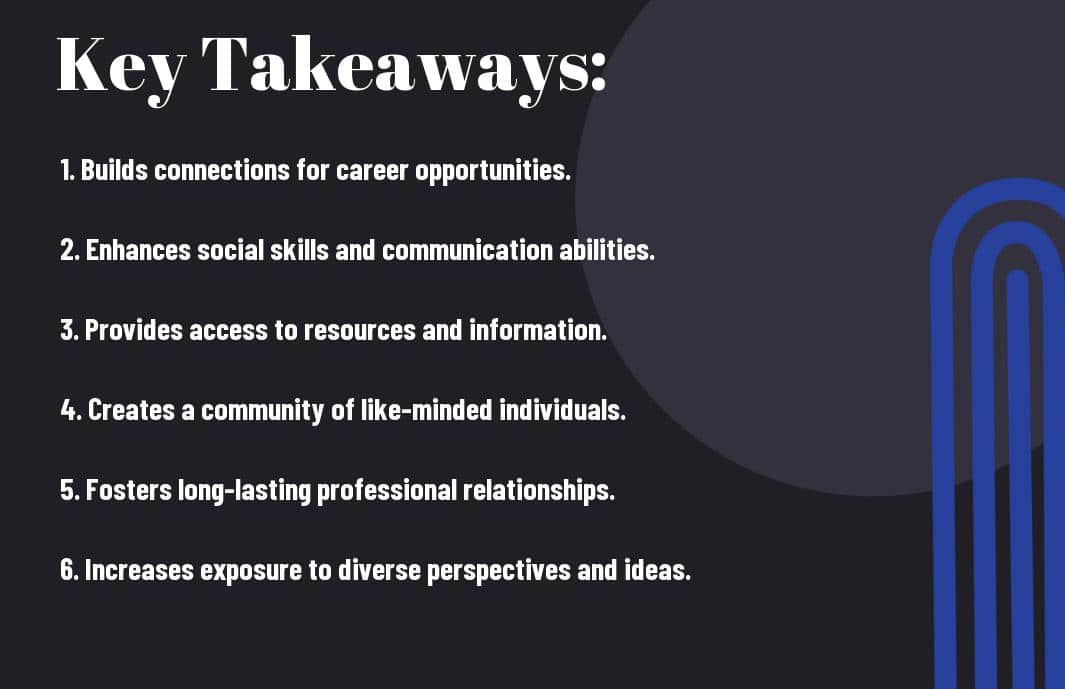Over the years, networking has become a crucial element in any individual’s path to success, especially in the realms of university and beyond. Building relationships with classmates, professors, and professionals in your field can open up a world of opportunities that you never knew existed. It’s not just about what you know, but who you know that can truly accelerate your career growth. Whether you’re searching for internships, job opportunities, or seeking advice, having a solid network can make all the difference. So, start connecting, engaging, and nurturing those relationships now, because you never know when they might pay off in the future.
Key Takeaways:
- Build relationships: Networking is all about forming genuine connections with people who can support you professionally and personally.
- Utilize resources: Universities offer a variety of networking opportunities such as career fairs, alumni events, and industry-specific workshops that can help you expand your network.
- Stay connected: Networking does not end once you graduate. Stay in touch with contacts, attend industry events, and leverage social media platforms to continue growing your network throughout your career.


The Hustle of Networking
Why Your Network Equals Your Net Worth
For those looking to succeed in university and beyond, the value of networking cannot be overstated. Your network is your net worth – the relationships you cultivate can open doors, provide valuable insights, and support you in achieving your goals. In a world where opportunities often come through people, the connections you make today can shape your future success.
Breaking the Ice: Making the First Move
Move over fear and hesitation, it’s time to break the ice and make the first move in networking. Initiating conversations with strangers can be daunting, but remember: everyone is there for the same reason – to connect and build relationships. Whether it’s approaching a speaker after an event or striking up a conversation at a networking mixer, taking that first step can lead to meaningful connections.
It’s all about standing out authentically and showing genuine interest in others. Bear in mind, networking is a two-way street – it’s not just about what you can gain, but also what you can offer. By listening actively and being curious about others, you can start building relationships that are mutually beneficial in the long run.
Strategies for Long-Term Synergy
Nurturing Relationships Like a Pro
Many times, we focus on making as many connections as possible without truly nurturing them. The key to long-term success is maintaining and growing the relationships you make. Note, it’s not just about who you know, but how well you know them. Take the time to follow up, engage, and add value to your connections consistently. Show genuine interest in their lives and goals, and watch how your network blossoms.
Creating Value: Beyond Just Taking
The secret to building a powerful network lies in creating value for others, not just focusing on what you can gain. The networking game is all about reciprocity. Value comes in many forms – whether it’s offering your skills, providing helpful resources, or simply being a supportive ear. When you shift your focus from taking to giving, you’ll find that doors start opening for you in ways you never imagined.
When you create value for others, you position yourself as someone worth knowing and having in their network. People remember those who go the extra mile to help them succeed. Don’t underestimate the power of generosity in forging long-lasting, mutually beneficial relationships. It’s not just about networking; it’s about building a community of supporters who will champion your success.
Leveraging the Digital Age
To The Role of Networking in College and Beyond, the digital age has revolutionized how we connect and build relationships. Leveraging digital platforms is necessary in today’s world to expand your network and opportunities.
Social Media Savvy: Connecting Online
With the rise of social media, connecting online has never been easier. Platforms like LinkedIn, Twitter, and Instagram allow you to reach out to professionals in your field, join relevant groups, and showcase your expertise. Building a strong online presence can lead to new connections, job opportunities, and invaluable insights into your industry.
Personal Branding: Your Digital Handshake
Savvy professionals understand the power of personal branding in the digital age. It’s not just about what you know, but how you present yourself online. Creating a compelling personal brand through a polished LinkedIn profile, consistent messaging across platforms, and engaging content can set you apart from the competition and attract the right opportunities.
It’s crucial to remember that your digital footprint is permanent and can impact your reputation. Be mindful of what you post, engage authentically with your audience, and consistently demonstrate your value to build a strong personal brand that opens doors.
The Real-World Arena
Networking in Your Career: The Climb
Despite what you might think, networking doesn’t stop once you land your first job. In fact, it’s just the beginning of the journey. On your climb through your career, networking becomes even more crucial. Every connection you make can open up new opportunities, help you navigate challenges, and broaden your professional horizons. So, never underestimate the power of building and maintaining relationships in the real-world arena.
Alumni Advantage: Staying Connected
Advantage of staying connected with your alumni network is unmatched. These are the people who have walked the same path as you, faced similar challenges, and have now ventured into various fields of work. On a professional level, tapping into this resource can offer invaluable insights, mentorship, job leads, and potential collaborations. So, don’t overlook the goldmine that is your alumni network.
It’s not just about reaching out when you need something but also about offering your help and expertise in return. This reciprocity forms the foundation of a strong network that can support you throughout your career.
FAQ
Q: Why is networking important in university and beyond?
A: Networking is crucial in university and beyond because it can open doors to new opportunities, help you build relationships with professionals in your field, and provide valuable insights and advice.
Q: How can networking benefit students while they are still in university?
A: Networking while in university can help students land internships, secure mentorship opportunities, and gain knowledge about different career paths and industries.
Q: What are some effective ways for students to network in university?
A: Students can network in university by joining student organizations, attending career fairs and networking events, connecting with alumni, and building relationships with professors.
Q: How can networking help students transition from university to the workforce?
A: Networking can help students transition from university to the workforce by providing job leads, referrals, and insights into the job market and industry trends.
Q: What are some networking strategies students can use to expand their professional network beyond university?
A: Students can expand their professional network beyond university by attending industry conferences, joining professional associations, using social media platforms like LinkedIn, and conducting informational interviews with professionals in their desired field.
Q: How important is it to maintain and nurture professional relationships throughout your career?
A: It is vital to maintain and nurture professional relationships throughout your career because these connections can lead to job opportunities, collaborations, and ongoing support and mentorship.
Q: What advice do you have for students who may feel intimidated by the idea of networking?
A: Don’t be afraid to put yourself out there and connect with others. Note, networking is about building genuine relationships and learning from others. Start small, be authentic, and keep in mind that everyone has been in your shoes at some point.





